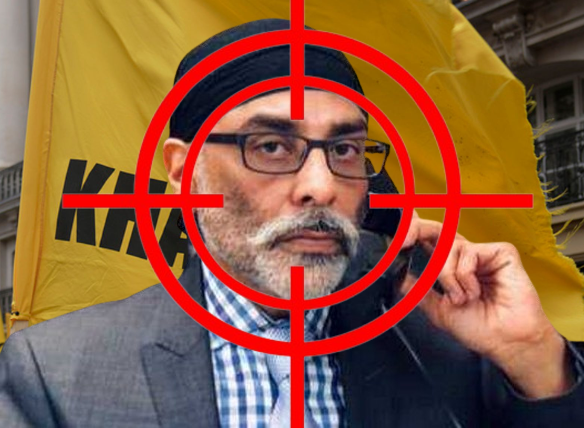
- Gurpatwant Singh Pannun designated a ‘terrorist’ by India and a pro-Khalistan terrorist, becomes a focal point that could strain ties between India and the US if not handled judiciously.
- India’s cooperative response to the Khalistani murder allegations from the Biden administration contrasts with its reaction to Trudeau’s claims.
- These allegations emerge at a critical juncture as India and the US seek to strengthen ties to counter China’s influence in the Indo-Pacific region, heightening the stakes for both nations.
The recent US indictment has accused an Indian official of recruiting Nikhil Gupta to assassinate Sikh separatist leader and terrorist Gurpatwant Singh Pannun in New York, connecting Gupta to the murder of another Khalistani separatist in Canada. These allegations prompt scrutiny of the India-US relationship and their response compared to similar accusations from Canada.
The dilemma for the Indian Government intensifies as allegations of murdering or attempting to murder Khalistani terrorists on foreign soil mount, with the US now aligning with Canada in making such claims. Gurpatwant Singh Pannun designated a ‘terrorist’ by India and a pro-Khalistan leader, becomes a focal point that could strain ties between India and the US if not handled judiciously.
The US recently charged Nikhil Gupta with plotting to assassinate Pannun on American soil, a plot thwarted by US agencies. While India initiated a high-level probe in response, its reaction differs significantly from its response to Canada. The US chargesheet links Gupta to the June murder of another Khalistani terrorist, Hardeep Singh Nijjar, in Canada. Despite dismissing Canada’s claims as ‘absurd,’ India acts swiftly when facing similar allegations from the US.
The nuanced dynamics between India and the US, with ties deeper than those with Canada, raise questions about whether their relationship will be value-based, aligning with Democratic principles, or interest-based, as former President Donald Trump favoured.
The US indictment, dated around May 2023, implicates an Indian official recruiting Gupta during Prime Minister Narendra Modi’s visit to Hiroshima for the G7 and Quad leaders’ summit with President Joe Biden. This period also saw the conclusion of the India-US Defence Industrial Cooperation Roadmap, emphasising technology cooperation and co-production in mutual interest areas.
Significantly, the charges mention Gupta’s correspondence with an Indian government official identifying as a “Senior Field Officer” with responsibilities in “Security Management” and “Intelligence.” The US allegations directly implicate the Indian Government in the murder-for-hire plot against Pannun.
India’s cooperative response to the Khalistani murder allegations from the Biden administration contrasts with its reaction to Trudeau’s claims. The Democrats’ emphasis on values over interests adds complexity, especially as a dual US-Canada citizen becomes the ‘victim’ of Indian recruitment in the alleged plot.
These allegations emerge at a critical juncture as India and the US seek to strengthen ties to counter China’s influence in the Indo-Pacific region, heightening the stakes for both nations.
(The author is a post-graduate student in International Relations at Kalinga University, Raipur. Views and opinions expressed are the author’s own)
Aayush Pal is a freelance writer on contemporary geopolitical developments. The views expressed in his work are entirely his own.
